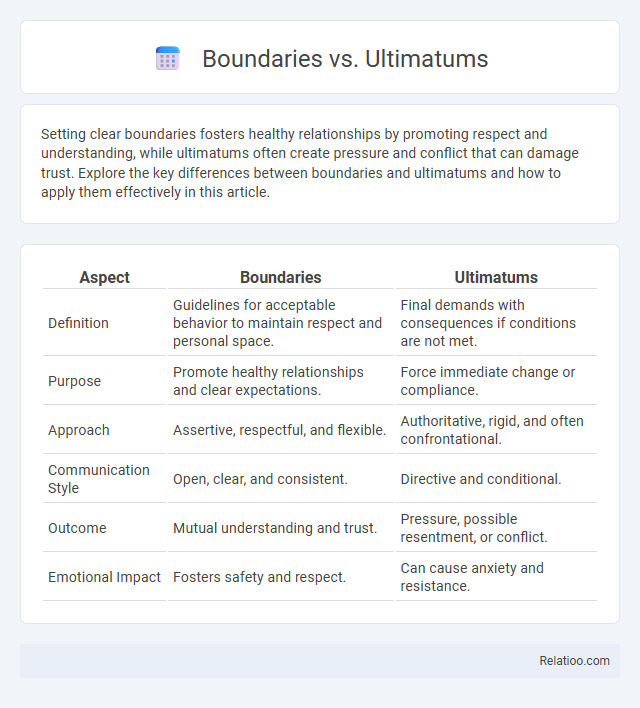Setting clear boundaries fosters healthy relationships by promoting respect and understanding, while ultimatums often create pressure and conflict that can damage trust. Explore the key differences between boundaries and ultimatums and how to apply them effectively in this article.
Table of Comparison
| Aspect | Boundaries | Ultimatums |
|---|---|---|
| Definition | Guidelines for acceptable behavior to maintain respect and personal space. | Final demands with consequences if conditions are not met. |
| Purpose | Promote healthy relationships and clear expectations. | Force immediate change or compliance. |
| Approach | Assertive, respectful, and flexible. | Authoritative, rigid, and often confrontational. |
| Communication Style | Open, clear, and consistent. | Directive and conditional. |
| Outcome | Mutual understanding and trust. | Pressure, possible resentment, or conflict. |
| Emotional Impact | Fosters safety and respect. | Can cause anxiety and resistance. |
Understanding Boundaries and Ultimatums
Boundaries define personal limits that guide acceptable behavior and protect emotional well-being, while ultimatums are rigid demands expecting immediate compliance often risking relationship strain. Understanding boundaries involves recognizing one's values and communicating needs clearly without coercion, promoting respectful interactions. Differentiating boundaries from ultimatums is essential for healthy relationships and effective self-care, ensuring balance between assertiveness and empathy.
Key Differences Between Boundaries and Ultimatums
Boundaries define your personal limits and communicate what behaviors you will accept, serving as a proactive means to protect your well-being and maintain healthy relationships. Ultimatums, by contrast, present non-negotiable demands often paired with consequences, which may create tension or resentment rather than mutual respect. Understanding the key differences helps you implement self-care by respecting your own needs without resorting to coercion or control in interactions.
The Importance of Setting Healthy Boundaries
Setting healthy boundaries is essential for maintaining emotional well-being and fostering respectful relationships, as they define limits on acceptable behavior and protect personal values. Unlike ultimatums, which can create pressure and conflict, boundaries encourage mutual understanding and empower individuals to prioritize self-care without guilt. Clear and consistent boundaries help prevent burnout, reduce stress, and promote a balanced life by ensuring that personal needs are honored and respected.
Recognizing When Ultimatums Arise
Ultimatums arise when boundaries are ignored or violated, signaling a critical moment in protecting your emotional well-being. Recognizing these moments helps you distinguish between healthy self-care practices and controlling demands that can strain relationships. Clear boundaries promote respect and balance, while ultimatums often indicate unresolved conflicts needing honest communication.
Emotional Impact of Boundaries vs Ultimatums
Boundaries create a respectful space that fosters healthy relationships and emotional well-being by clearly communicating your limits without demanding specific outcomes. Ultimatums, however, often trigger stress, resentment, and conflict, as they impose rigid demands that can undermine trust and emotional safety. Prioritizing boundaries over ultimatums supports your emotional resilience and encourages mutual understanding and respect.
Communication Strategies for Boundary-Setting
Effective communication strategies for boundary-setting include clearly expressing your needs and limits using assertive, respectful language to prevent misunderstandings and resentment. You can set boundaries by using "I" statements that focus on your feelings and preferences without blaming others, which fosters mutual respect and cooperation. Establishing boundaries differs from ultimatums, as it involves ongoing dialogue and flexibility, promoting your self-care and emotional well-being.
Common Mistakes: Boundaries Turning Into Ultimatums
Setting clear boundaries is essential for maintaining healthy relationships, but confusing them with ultimatums can backfire and damage trust. Common mistakes include using ultimatums as a coerced demand rather than a respectful limit, which can lead to resentment and reduce the effectiveness of your self-care efforts. Understanding the difference helps you protect your well-being without escalating conflicts or alienating others.
Navigating Relationships With Clear Boundaries
Navigating relationships with clear boundaries involves defining your limits to protect your emotional well-being and promote mutual respect. You can reinforce healthy interactions by distinguishing boundaries from ultimatums, as boundaries communicate your needs while ultimatums may create conflict. Prioritizing self-care ensures that your boundaries align with your values, fostering balanced and supportive connections.
Consequences of Using Ultimatums
Using ultimatums often leads to damaged relationships and reduced trust because they create pressure rather than understanding. Unlike healthy boundaries that promote respect and clarity, ultimatums can trigger resentment and resistance, making resolution difficult. Your attempts to protect yourself may backfire if ultimatums are perceived as threats rather than self-care.
Building Respectful Connections Through Boundaries
Establishing clear boundaries helps you communicate your needs and limits effectively, fostering mutual respect in relationships without resorting to ultimatums. Unlike ultimatums, boundaries encourage healthy interactions by promoting understanding and cooperation rather than control or fear. Prioritizing self-care through boundary-setting strengthens your emotional well-being and builds respectful connections that honor both your values and those of others.

Infographic: Boundaries vs Ultimatums
 relatioo.com
relatioo.com